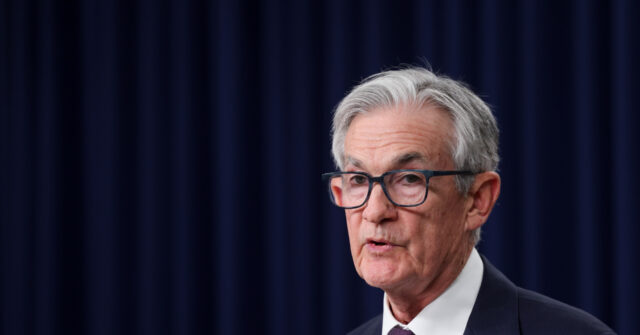President Donald Trump once again took aim at Federal Reserve chairman Jerome Powell on Thursday, apparently unhappy with the central bank’s decision Wednesday to hold its interest rate benchmark steady.
“‘Too Late’ Jerome Powell is a FOOL, who doesn’t have a clue. Other than that, I like him very much! Oil and Energy way down, almost all costs (groceries and “eggs”) down, virtually NO INFLATION, Tariff Money Pouring Into the U.S. — THE EXACT OPPOSITE OF “TOO LATE!” ENJOY!” Trump posted on Truth Social.
The Fed said on Wednesday that it was leaving the target range for the federal funds rate unchanged at 4.25 percent to 4.5 percent, the third time it has done so this year. The Fed dramatically cut interest rates three times in the final months of Biden’s presidency, starting with a half-point reduction in September that was followed by two quarter-point reductions in November and December.
The Fed described economic growth as “solid” in the statement released at the end of its two-day monetary policy meeting, but noted that “the risks of higher unemployment and higher inflation have risen.” While many analysts have significantly increased the odds of a recession over the next 12 months and surveys of businesses and consumers reveal slumping confidence, Powell said he has not seen weakness in the economic data.
The economy contracted slightly in the first quarter of the year, according to the government’s official GDP metric. The Fed seemed to downplay the importance of the contraction, however, noting that it was due to a surge in imports that have distorted the data. At the press conference on Wedensday, Powell said he expects the estimate of growth to be revised up once more data is avaiable.
The Fed is seen as caught up in the drama around the Trump administration’s trade policies, including uncertainty about how the economy will react. Some analysts think the biggest risk is to growth and employment, while others think inflation could be sparked by price hikes implemented to offset the tariffs. The most dire—if unlikely—result would be a combination of low growth and rising prices, a rare development known as stagflation.
Fed Governor Christopher Waller has said he expects prices to increase due to tariffs but that this would be a one-time event rather than the beginning of an inflationary cycle. The bigger risk, in his view, would be slower economic growth and a softer labor market, developments that would prompt the Fed to cut interest rates. Other Fed officials are more worried about inflation, pointing to rising inflation expectations in surveys of consumers, or uncertain about what the effects will be.
The Trump administration’s defenders say that the combination of tax cuts and deregulation will offset any drag from the increase in import duties. As well, they expect tariffs will encourage investment in domestic production, increasing the supply of domestically manufactured goods. This could lead to a more rapid pace of economic growth while inflation stays low.
At his press conference following the Fed meeting, Powell said it was still too early to tell what the economic consequences of the tariffs would be. He also said President Trump’s criticisms were not a threat to Fed independence and would not impact its decisions on monetary policy.
“We are always going to do the same thing, which is we are going to use our tools to foster maximum employment and price stability for the benefit of the American people,” Powell said. “We are always going to consider only the economic data, the outlook, the balance of risks and that’s it. That’s all we are going to consider.”
Last month, Trump’s criticism of Powell set off a firestorm of speculation that the president might try to remove the chairman before his term expires next year. President Trump strongly denied that he had any plans to fire Powell.
“No, no, no. Why would I do that? I get to replace the person in another short period of time,” Trump said.
Read the full article here


